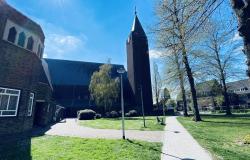For the supporters of the late Russian opposition leader Alexei Navalny, the past forty days have been full of sadness, doubt and fear. But Navalny’s grave is now also a place of comfort and hope. Supporters see that they are not alone. Although their silent resistance is not without danger.
“I’m so tired of being scared now that I decided to come today to thank him,” says a girl visiting the grave. A boy says: “You have to come, when you see what has been happening in the country in recent years. And Alexei has given everyone courage. People now understand that you can fight.”
But the Russian authorities are doing everything they can to prevent the condolences from turning into demonstrations. Those who express messages of support are silenced or worse.
Silent resistance
Navalny is dead, other opposition leaders are in prison for many years and some have fled. But their supporters are still there: there are regular demonstrations in various places in Moscow in support of political prisoners. “Everyone knows someone in prison, or knows someone who knows someone like that,” says one of the participants. “Unfortunately, there are many such people now.”
In a country where being politically active is now life-threatening, they opt for a form of silent resistance. A group of people keep in touch with the many political prisoners through fundraising campaigns and letters. “That they know in prison that there are people who think about them, who write to them, who are in contact with them. It is necessary support: so they feel that they did not do it in vain.”
Much of Navalny’s team has fled abroad. Nikolay Lashkin is one adviser from Navalny’s team who is still in Moscow. “Aleksey showed us how to live. His death is a terrible tragedy for all of us, a colossal loss. But we all now have an example of how to do politics,” he says.
We live in a Russia ruled by people in uniform.
And doing politics can also be done on a small scale, as it turns out in Moscow. The initiative for political prisoners is popular with young people. “That gives hope for the future,” says an older woman. “As Navalny said, it is a shame to do nothing. It may be something small, but the most important thing is that you do something.”
Extremism
One of the political prisoners is Antonina Favorskaya, from the independent SOTAvision. She was sentenced to ten days in prison for disobeying the police. She said in court: “They are so afraid of a dead Navalny that they are now putting pressure on us too.”
She was supposed to be released last night, but that didn’t happen. Instead, two reporters who were waiting for her in front of the prison were arrested. Today, Favorskaya’s apartment was also searched and Favorskaya is again accused, this time of extremism.
Watch images of the arrest of the two journalists here:
Journalists arrested in Russian prison
“People disappear behind bars for seven, eight, ten years because of what they say,” says Navalny’s adviser Lashkin, who therefore wants to formulate his words carefully. Yet he speaks out: “Our secret services could be concerned with completely different things than suppressing the opposition, inventing ‘foreign agents’ and banning organizations that express healthy and justified criticism.”
In Russia, social problems, corruption and theft fade completely into the background, says Lashkin. “The secret services punish people while protecting the crooks in power. We live in a Russia ruled by people in uniform. Unfortunately, fear is what comes from our government. No help, no care, no social support, alone but fear.”
A young woman at Navalny’s grave still holds out hope for changes in the future. “I had the idea that it was mainly young people who supported Navalny. But at the funeral I understood that it was completely different. It was not only young people, but also elderly people. The propaganda gets into your head, especially the thought that we are a minority. And that is just as untrue as anything else. After seeing all those people, I have hope again.”
What is left of the Russian opposition after Navalny’s death? Watch our video:







